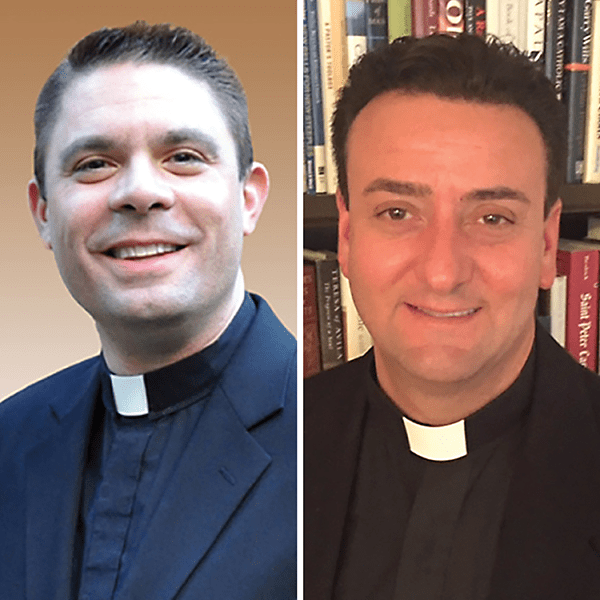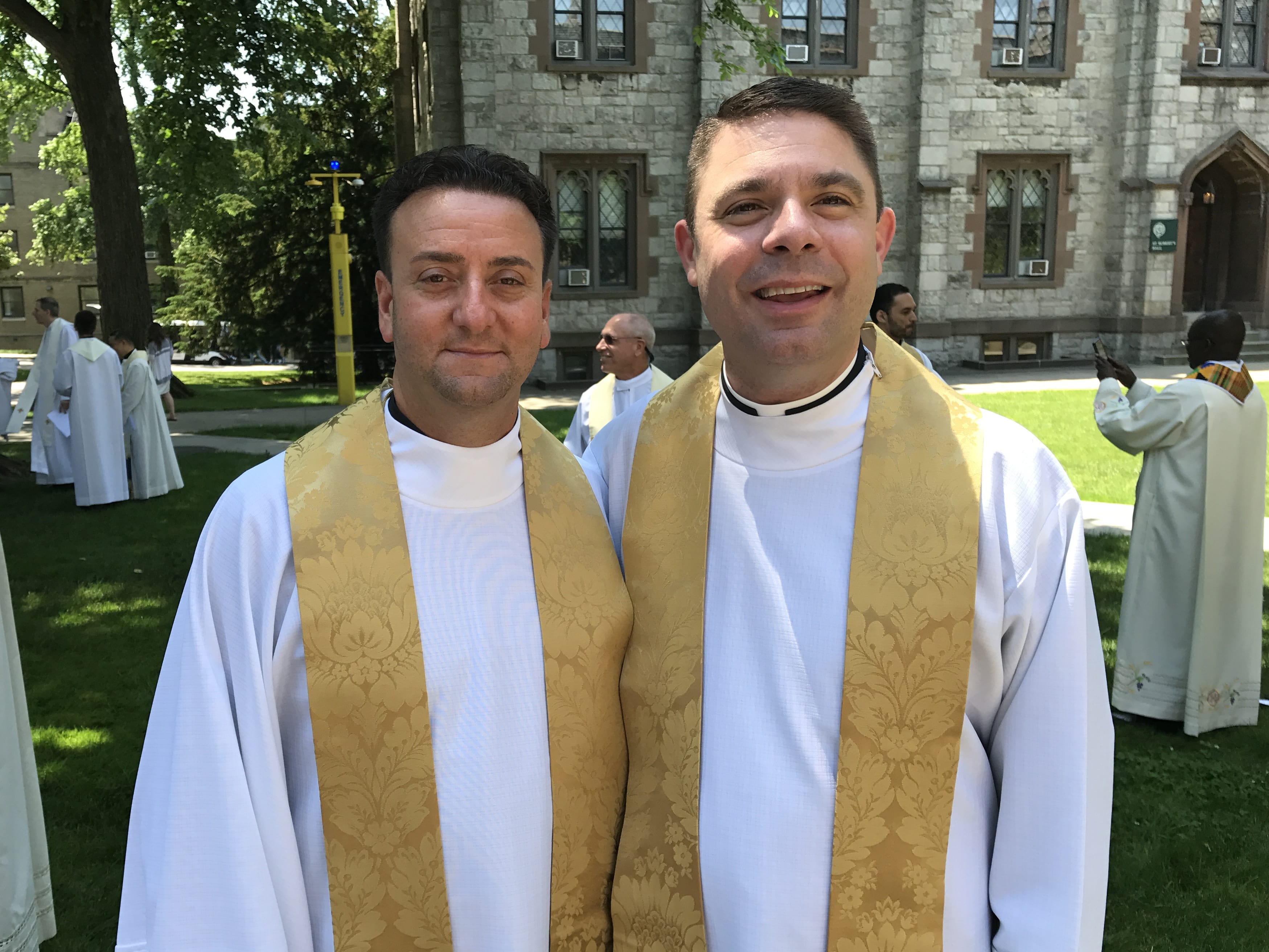“Listen to your heart, pray the examen, and see how you are being invited by God to use the gifts He has given you to make the world a better place.” — Fr. Chuck Frederico, SJ
This summer, Fr. Charles (Chuck) Frederico, SJ, stepped down as director of vocations for the Maryland and USA Northeast Provinces, having served for eight years. A graduate of Saint Joseph’s University, he will now return to Philadelphia as director of mission at St. Joseph’s Prep.
Fr. Philip Florio, SJ, who has worked in Philadelphia himself the last two years as pastor of Old St. Joseph’s Church, will now assume the vocations director role for our two East Coast provinces.
With this changing of the guard guiding the vocations office, JESUITS spoke with Frs. Frederico and Florio about the vital functions the office provides to our provinces. Fr. Peter Hans-Kolvenbach, SJ, a former superior general for the Society of Jesus, once said, “The ministry of vocation promotion is crucial and determinant for the future of the Society and the service it is called upon to offer in the Church. Vocations are a gift from God, but a gift conditioned upon our efforts to raise them up and discover them.” The call to religious life as a Jesuit priest or brother is indeed a challenging and rewarding calling for a young man to discern. A vocations director must help these potential candidates to “rise up and discover” their calling.
 |
Fr. Charles Frederico, SJ
Vocations Director, 2009 – 2017
Fr. Frederico, what method of promoting vocations to the Society of Jesus did you find the most rewarding and successful?
I intentionally nurtured a relationship with all the high schools on the East Coast, attempting to build bridges and plant seeds for future discernment among the young men about what God might be calling them to later in life. The school presidents, principals and campus ministry directors work with their faculty and staff to identify 20-25 young men who had expressed interest in a vocation previously or who they viewed would make a good candidate for the Society of Jesus. With this group, I would then share lunch (often pizza—one of my favorites) and speak heart-to-heart about their experiences at their school, including their time on retreats. I invited them to pay attention to their hearts, pay attention to the Examen (which each school has done so well instilling into the fabric of the school), learn to seek Jesus in their service with new eyes and attentive hearts, and to not be afraid to ask questions of others. I encouraged them to speak to the Jesuits and our committed colleagues about the possibility of priesthood or brotherhood in the Society of Jesus.
These discussions were so moving. The students were so revelatory and shared where they had seen and heard Jesus in their experiences. I encouraged them to let that be of more or equal value as to what the rest of culture throws at them. Let the moments of Kairos really help carry them forward and discern those classic Ignatian questions (What have I done for Christ? What am I doing for Christ? and What can I do for Christ?). In that time, in those moments, maybe—just maybe—Jesus could be inviting each or all of them to the Company, a life in the Society of Jesus.
What aspects of religious life as a Jesuit seem to resonate most with possible candidates?
The most significant aspect of religious life that young men have spoken to me about is their desire for community. They want to make a difference in the world with the gifts that God has given them and they want to be with others who are doing it. People at their core are communal and long to be with others. The young men I have worked with all have had incredible experiences of service and have felt the way God works in them. These experiences encourage them to share their faith and to pray together with others who are like-minded. I think both the Jesuits’ reflective prayer and missionary spirit invite young men to want to serve Christ together for and with others.
|
What are the biggest challenges they usually face?
The biggest challenge a man discerning faces is quieting himself down to gain a capacity for reflectiveness—to gain a capacity to see and hear Christ within—to gain a personal relationship through interiority. That quiet and reflectiveness is hard to come by in a world driven by the Internet, constant noise, and a general demand on time. I also think smaller families place a demand on young men who may be considering this great life. Parents want success and grandchildren from their sons. When a family that would have once had five, six, seven children now only has one or two, one’s life view changes and it is not out of any disrespect for the Church. The practical realities of caring for loved ones comes into play as well.
How best does a vocations director accompany an interested candidate in their discernment?
The accompaniment of a candidate is truly a rich experience because the journey involves listening and discerning alongside of him to hear, “How is it that the Lord is speaking to you?” The accompaniment involves teaching him how to pray, providing him experiences or glimpses into our Jesuit life, our mission, our communities. Much of this is only possible because of the generosity of our benefactors who donate money so that we can do direct promotion, pay for travel expenses, offer programming, and provide materials that speak to the heart of the matter, such as books by Jesuit authors. I spent many wonderful hours talking with guys and listening to their journey of how God had manifested Himself and how they perceived God calling them.
What advice would you give to someone who might be contemplating a call to the Jesuits, or any religious vocation?
My advice is always, “Listen to your heart, pray the Examen, and see how you are being invited by God to use the gifts He has given you to make the world a better place.” Leave time for silence in your life; don’t be afraid of loneliness—loneliness exists as a reality of our human nature. To quote a dear Jesuit friend of mine, Fr. Nick Rashford, SJ, (former president of Saint Joseph’s University): “Our Jesuit life and ministry intimately involves you into the lives of people in their happiest and saddest moments. Be humble, love them, and help them see God in the moment—that’s what it means to be a Jesuit.”
 |
Fr. Philip Florio, SJ
Newly appointed vocations director and former pastor of Old St. Joseph’s Church
Fr. Florio, having served in campus ministry and spiritual direction at several Jesuit universities and most recently as pastor of Old St. Joseph’s Church, what aspect or experiences of your call as a Jesuit do you feel best prepare you to serve as vocations director?
Having served as a pastor at Old St. Joe’s, and having worked closely with young people as a campus minister, spiritual director, and teacher, I am confidently hopeful that I have learned much about what inspires, challenges, and consoles our younger generation. This knowledge ought to prove helpful and, quite frankly, crucial, as my role as vocation director will be spent, in large part, accompanying, supporting, and assessing our candidates for entrance into the Society.
What are you looking forward to most in your new assignment as vocations director?
The single thing that excites me most about my new ministry is the opportunity to help someone in discerning their vocation. It is, in my opinion, a holy ministry to help another discover that to which God may be calling them, whether it be to marriage, to the single life, or to the priesthood or consecrated life. As my own Jesuit vocation has taught me, a vocation is solely from God. Therefore, accompanying another who is considering imitating Jesus as a Jesuit, is simply mind-blowing. To be able to accompany another as they delve deeply into the recesses of their heart and soul is both an awesome privilege and a tremendous grace. I am beyond humbled to be asked to do this for our provinces.
Why is it important for a Jesuit vocations director to connect with young men who might be contemplating a call to the Society of Jesus?
One word—accompaniment. We do not assume this Jesuit life alone; no one can live the vows of poverty, chastity and obedience in isolation. One thrives in the religious life where there is prayerful support and companionship; indeed no one is an island in this sacred venture. To be able to connect with young men discerning our way of life is to be able to accompany them, as Jesus accompanied his disciples—walking together on the road, breaking bread together, praising God together in prayer and loving God’s people together in service.
|
What attributes will you look for in the candidates you meet?
As the advocate for our provincials who will ultimately accept the men for entrance into the Society, it is paramount that I seek those who meet the requirements prescribed by the Society of Jesus and by the American Bishops. These requirements are many, chief among them being in good physical and mental health, a growing spiritual life, increasing self– knowledge, and one’s ability to live and work with others, both in and out of religious community. The way that we do that is through careful assessment of a candidate. It is the primary objective of the vocation director, with the assistance of the vocation team, to gather as much data as possible to produce some indications that a man might have a calling to the Society. We’re not looking for a fully formed Jesuit at this point, simply a man who is open to Jesuit formation and who is primarily in a good relationship with Jesus Christ.
Being in a relationship with Jesus requires attention to personal prayer, to the Holy Eucharist, and to the sacraments of the Church. Naturally, we seek men who have an affinity for the Society of Jesus and its sacred mission of promoting faith and serving justice—a man who can serve others, in imitation of Jesus, with openness to wherever the Society’s mission may lead.
What advice would you give to someone who might be contemplating a call to the Jesuits, or any religious vocation?
My advice is simple, and that which was given to me when I discerned my own vocation—pay attention in prayer to the movement of the Holy Spirit in your heart and in your soul, and if you believe God may be calling you to the Society of Jesus, surrender quickly, as there is no use resisting, since God cannot be resisted. Then, earnestly pray for the courage to reach out to someone (a teacher, a pastor, a counselor, a priest or consecrated religious, or our website) who can direct you to the Jesuit Vocations Office. Our longstanding discernment process is thorough, deep, informative, and especially prayerful, and has the amazing capacity to help someone discern if God is indeed calling him to be a companion of Jesus in the Society.



